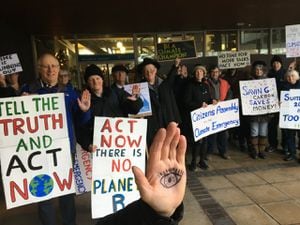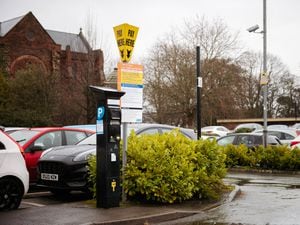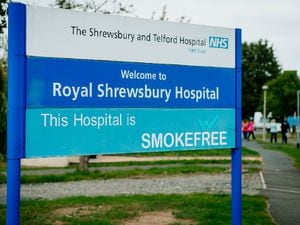Climate change the hot topic at Shropshire Council
Shropshire Council must work to ensure the county, not just the council is carbon zero by 2030/ councillors and campaigners have warned.

The full council today approved its Climate Change Strategy to ensure the council is, itself, carbon neutral in the next decade.
But an amendment saying that the target should be for Shropshire as a county was voted down.
A report to members said Shropshire Council had been working for the past 10 years to cut its carbon footprint, with projects from solar panels and LED lighting to tree planting, and said that it could reach the zero carbon target by 2030.
Cabinet member for climate change, Councillor Dean Carroll said: "The council is leading by example."
Councillor Steve Davenport said that the council was looking at transport solutions such as electric buses and hydrogen-driven vehicles.
Several councillors said the council's target should be for the entire council not just the authority.
Councillor Hannah Fraser put forward the unsuccessful amendment that the framework should be that Shropshire should be carbon neutral by 2030.
"Shropshire's carbon footprint was 1.76 tonnes C02e in 2017. The council's contribution is just 1.3 per cent of that," she said.
Budget
"What we do will have no affect on the overall problem. We need to start being pro-active here."
Councillor Alan Moseley said money had to go into the budget for climate change action.
"If there is no money in the budget this will simply be a talking shop.
"We also need to use our powers of procurement to bring about real change by our contractors."
Green Party councillor Julian Dean also said the council had to ensure its contractors made changes.
Councillor Roger Evans claimed the item was becoming too political.
"This is too important for politics," he said.
"We must work together to take action."
Extinction Rebellion
There was a large public presence at the meeting.
Members of Extinction Rebellion stood outside the Shirehall before the meeting with banners calling on the council to act now to combat climate change.
A petition, bearing over 1,000 signatures, was handed over from Mr Frank Oldaker on behalf of Shrewsbury Friends of the Earth. The petition called on the council to agree a target date of 2030 for achieving ‘net carbon zero’ emissions from the council’s activities, and to design an action plan in accordance with this target.
"We welcome the council’s declaration of a climate emergency and commitment to work towards net zero greenhouse gas emissions for the council’s activities and for the county. But time is short," Mr Oldaker said.
Shrewsbury businessman, Mark Fermor, speaking to the council, said Shropshire had to act even more quickly.
Council's carbon footprint falls
Shropshire Council's carbon footprint has fallen by almost a third in five years, a report to council revealed.
Speaking before the meeting, Councillor Carroll said that the carbon neutral target was ambitious but achievable.
"The council's carbon footprint has fallen from around 31,000 tonnes CO2e in 2012 to around 23,000 tonnes CO2e in 2017," he said.
He said the council had already implemented a range of measures including building 41 solar energy arrays, installed across 28 of its sites, from the Shirehall to schools.
"The total greenhouse gas emissions avoided since their installation is nearly 3,000 tonnes CO2e with a financial saving to the council of £1.36 million," he said.
As well as making emissions savings the council is also working to increase the storage of carbon in Shropshire.
County ecologist, Dan Wrench, said a good example was tree planting, working with partners to ensure there were more trees in Shropshire.
"They capture carbon, they help reduce flooding and people love trees," he said.
Much of the work had been going on over the past decade.
Councillor Carroll said: "This is a reaction to climate change, it is not a reaction to pressure groups."He said: "It is now agreed that 2030 will be too late to ensure we avoid a runaway climate catastrophe."





